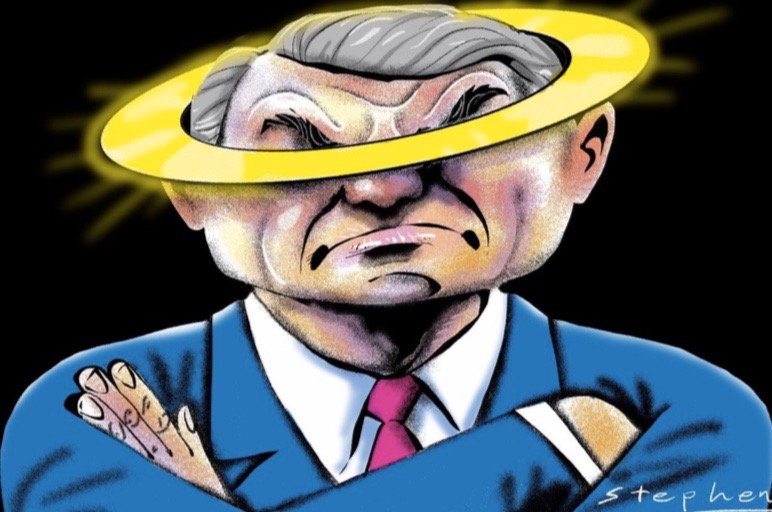TOM PLATE WRITES — There’s often little more than a thin line between admirable principle and annoying stubbornness, and that line is not always easy to identify. Lost in the miasma of mutually exclusive righteousness, each side says the other is wrong or evil or both. The tragic consequence is that both interlocutors, each smugly with their ‘truth’ entirely theirs alone, concoct an evil paradigm in their minds to bolster the legitimacy of their disagreement. Insanity brews – chaos beckons.
For starters, we submit for consideration the Korean Peninsula impasse. As the Pyongyang regime looks ready to proceed with amplifying its nuclear weapons capabilities, some Seoul factions propose that South Korea respond with a tit-for-tat nuclear startup of its own. And so, from the dashed hopes of the North Korea-U.S. summit in Singapore in 2018, which might well have brought the world a nuclear freeze or more had it not been so poorly prepared, we now face the specter of expanded nuclearization in the wider neighborhood: No one doubts that were Seoul to go nuclear, before long Tokyo would want to go too. This could push the region to the psychotic edge of nuclear paranoia.
Only rigorous and unrelenting diplomacy, conducted with commitment and skill, offer a potent generic antidote to international instability. From Stanford University, we have the wisdom of legendary North Korean nuclear expert Siegfried Hecker, one of the few outsiders to have examined the country’s main nuclear facility. His view is that while technical nuclear issues are indeed enormously complex, the political obstacles require the skills not so much of a rocket scientist as of a Daoist diplomat.
The recurring hurdle has been Pyongyang’s distrust of the U.S. going back decades, and the corresponding mistrust from Washington, with its self-admiring ‘principled’ position, which insists on “complete, verifiable and irreversible [nuclear] dismantlement” before the slightest measure of sanctions relief. Everyone in the world knows this is a poseur ‘principled’ position — utterly unrealistic, particularly in the absence of a peace treaty and calming security guarantees. More than anything, it mirrors, arguably, the psychological instability of America’s domestic politics, in which reason, compromise and harmony often get coded as symptoms of partisan disloyalty or as deficiencies of patriotism. And for its part, North Korea, well aware of the ‘principled’ anti-communist hatred of President Donald Trump’s right-wing base, is predicted to turn away from publicly prioritizing the economy to brandishing anew the menacing DPRK military profile – as ultimately self-defeating and morally hollow as that nutty and familiar ploy will prove.
Research shows that “the rate of North Korea’s nuclear development has slowed when diplomacy is working and sped up [when] diplomacy is halted,” according to Professor Heckler. Except in rare cases of deliberate diplomatic duplicity, wouldn’t this always have to be the case? Nations talk through problems in the belief that diplomacy can produce sensible results to which the parties can manage to adjust. Consider the South China Sea imbroglio. Having achieved many of its core objectives, Beijing is starting to talk to Hanoi in a professional manner. This is a significant development, exclusively reported earlier this week by the South China Morning Post’s Laura Zhou.
For years nothing has more reflected the pushy prow of the Xi administration’s naval presence than its ‘principled’ reassertion of a special place under the South China Sea sun. After the ‘century of humiliation’ Beijing seems geared up for a century of assertion. Aside from the red-neck nationalistic appeal, that approach has had the effect of recalling the indelicacy of the former Soviet Union and will do less to accomplish a healthy China rejuvenation than would a more determined diplomacy. ‘Principles’ that are little more than painful remembrances of slights past can tie up nations in a haunting resurrection of that past. (It would not be just a weak joke to suggest that Hitler and his Reich would have done better had they forgotten all about the humiliation of Versailles and instead economically invaded Europe with marvelous exports like their Volkswagen.)
A diplomacy century, led by China in Asia, would be a worthy successor to the ‘humiliation century’. Yes, America should be leading the world in the negotiating arts but instead seems to lead with a right uppercut of diplomatic insult. You can declare a trade or any other sort of war against China that you want, but it doesn’t mean you can win it. Now the Trump administration looks eager to wind down the idiotic tariff tussle that it idiotically started. The current president’s economic-trade team, seemingly on academic steroids, reminds one of President George W. Bush’s pro-war team – always gung-ho for another ‘principled’ but fatally confused mission. Claiming that it was always a position of U.S. principle to call out China for unfair trade tricks is not the same thing as efficiently correcting the problem: Nations and individuals sometimes have to choose between being right or being effective.
Twenty-first century update: Washington is no longer at the head of the class – the teacher who commands ruling-breaking student-nations to detention. Almost everything of international consequence will require negotiation or very little will get done for peace and stability. To this end, we admire Beijing’s startup talks with Hanoi and pray they succeed. Another set of talks that would be a relief to see would be in Hong Kong, where almost everyone makes claims to righteousness and hardly anyone ever admits to wrongheadedness. Locating the thin line between principle and stubbornness may be hard to do but unless all sides find it and accept the limits of their own vision, they might well wake up divided by a virtual Demilitarized Zone, in abject communal misery: the twilight of reason cowering in the face of unchecked ‘principle’.
Professor Tom Plate is the founder of Asia Media International (asiamedia.lmu.edu) and vice president of the Pacific Century Institute, both based in Los Angeles. The original version of this column appeared in the South China Morning Post, where the professor is a regular contributor.

